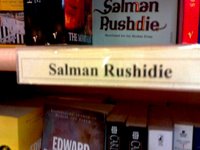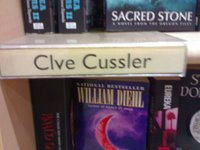The Mumbai edition of today's
Times of India contains an article by one Ayan Roy in the international section professing to be a round-up of events in the world of books and publishing. After asserting, "Originality went for a toss as fakes abounded", Mr Roy gives us this paragraph:
In January, the Smoking Gun Web site revealed that Frey's best-selling memoir "A Million Little Pieces" contained about that many little lies. Frey admitted he had a small problem with his best-selling true-life story of addiction and recovery, which was the part about the "true". Oprah Winfrey, who had included the book in her book club pick, first stood by her pick, but then berated him on her TV show. Eight months later, publisher Random House reached an unprecedented legal settlement with disgruntled readers who claimed they had been defrauded by Frey's book. The book, for the record, remained on the best-seller lists.Now, here's a paragraph from
Teresa Weaver's December 28 report for The News Observer:
In January, after the Smoking Gun Web site revealed that Frey's best-selling memoir "A Million Little Pieces" contained about that many little lies, Winfrey first stood by her book club pick, but then changed her mind and berated him on her TV show. Eight months later, publisher Random House reached an unprecedented legal settlement with disgruntled readers who claimed they had been defrauded by Frey's book. The book, for the record, remained on the best-seller lists.Heh-heh.
Back to Ayan Roy's piece. Here's another paragraph:
Then publisher Judith Regan lost her job over a scheme to offer "a truly fake true to life story". She announced the publication of a book called "If I Did It," purported to be Simpson's hypothetical version of how he would have killed his ex-wife, Nicole Brown Simpson, and Ron Goldman. When everybody on the planet recoiled in horror at the mere concept, Regan's boss, Rupert Murdoch, scuttled publication and ordered all 400,000 copies mulched. Within days, naturally, copies popped up on several online markets. They are still out there.Now, here's Teresa Weaver:
In November, notorious (and hugely successful) publisher Judith Regan announced the publication of a book called "If I Did It," purported to be Simpson's hypothetical version of how he would have killed his ex-wife, Nicole Brown Simpson, and Ron Goldman. When everybody on the planet recoiled in horror at the mere concept, Regan's boss, Rupert Murdoch, scuttled publication and ordered all 400,000 copies mulched. Within days, naturally, copies popped up on several online markets. And within weeks, Regan was unceremoniously fired.It ought to be mentioned that Mr Roy's piece includes several more names and incidents not found in Weaver's report. He does, however, write: "11-year-old Nancy li Fan made Christopher Paolini look like a doddering greybeard." That sounded familiar, so one checked it out. Sure enough, it's in
a September 27 post by the Babu. Note:
The Times of India article wasn't available online at the time of this post. It can be viewed, however, on
their e-paper. (Registration required.)







